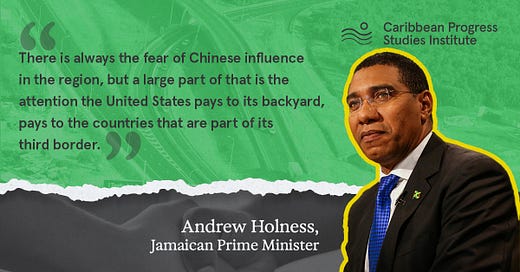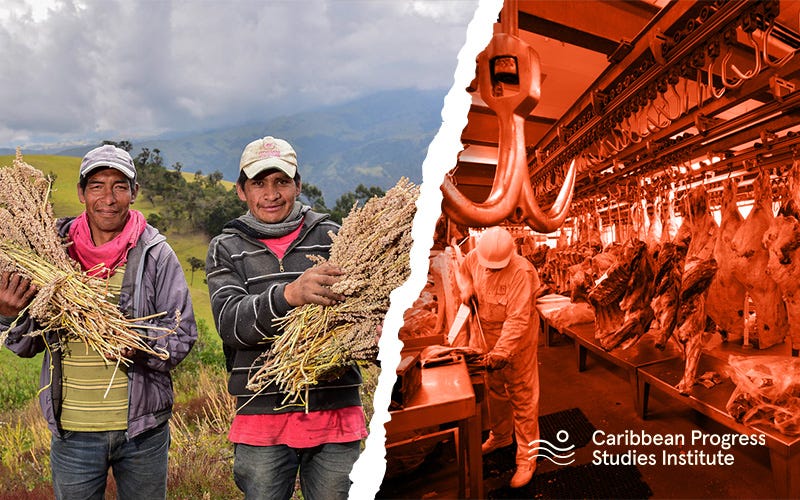Chaufa - Paying Attention to the Backyard
Petro's visit to Beijing, a Cuban-China economic commission, and the outlook from Argentina's election on ties with the PRC
Hi! Welcome to Chaufa, a China-Western Hemisphere Newsletter by CPSI.
Today’s Edition covers October 23 to October 29.
This Week’s Top 5 Stories:
During President Petro’s visit to Beijing this week, China and Colombia upgraded their relations to a strategic partnership, signed 12 agreements covering topics ranging from beef exports to education to media cooperation, and issued a joint declaration that included a confirmation that Colombia adheres to the One China principle.
The statement prompted the Taiwanese foreign ministry to issue a release condemning Colombia for joining China’s position.
Analysts suggest that Massa’s narrow win in Argentina’s presidential election could benefit Sino-Argentine relations given that second-place libertarian candidate Milei has threatened to freeze relations with Beijing.
Cuba’s Deputy Prime Minister met with Vice Premier He Lifeng and Minister of Commerce Wang Wentao and convened an intergovernmental commission on economic and technological matters. (Cuba News) (Xinhua)
Ryan Berg and Henry Ziemer wrote a new report for CSIS arguing that China is expanding its defense and security presence across Latin America and the Caribbean. They argue that this trend poses serious concerns for U.S. security and regional stability.
In a recent visit to the United States, Paraguayan president Pena confirmed that his country would continue to maintain relations with Taiwan.
My Take
Petro’s visit to China: A course correction rather than a sea change
Colombian President Gustavo Petro visited Beijing this week, becoming the first Colombian head of state to visit the PRC since Duque’s trip in 2019. Despite high hopes from some Colombians, the results from the president’s visit were a mixed bag.
First, the areas where substance does not really appear to have landed: trade and investment. Unlike when senior Nicaraguan officials traveled to China last week, or when Argentine President Fernandez met with Xi during the 2022 Winter Olympics, no specific new major investments, financing, or infrastructure projects were announced during the visit. Relatedly, Colombia continued to decline to join Xi’s signature Belt and Road Initiative.
While the two sides signed sanitary protocols to facilitate beef and quinoa exports, in 2021 Colombia only exported $105 million in bovine meat and $97,000 in quinoa. Though the Colombian government claims the country could export $1 billion of beef to China, this highly ambitious goal does not seem like it will happen in the near term, as it would mean Colombia would export as much beef to China as Brazil exported to the entire world in 2021.1 If the Petro administration was looking to juice the economy with new exports, these are unlikely to do so for the near future.
More progress was made in the creation of institutional mechanisms for collaboration, though the value of these working groups and forums will depend on future administrations rather than the creation of the mechanisms themselves. New working groups on trade, investment and economic cooperation, and tourism, as well as MOUs covering digital economy cooperation, ecological development, and agriculture cooperation, could prove valuable, but only if officials give them time and attention.
Given Petro’s ideological leanings,2 it should be no surprise that the most notable aspects of his trip were the social and political ones. If they come to fruition, new and expanded media, scientific, educational exchanges could improve people-to-people ties and generate more sympathy for the PRC. The upgrade in relations to a “strategic partnership” raises Colombia in China’s diplomatic hierarchy from normal diplomatic relations to the level of Bolivia or Uruguay.3 And as Berg and Ziemer raise in their new report, a mention of increasing exchanges and trainings between Colombian and Chinese military and police could raise hackles in Washington.
The Roundup
Politics and security
Canada’s foreign ministry accused China of spreading misinformation and conspiracy theories against Canadian officials.
The United Front’s Annual Assembly of the Association for the Promotion of the Peaceful Unification of China in Central and South America was held in El Salvador. (CGTN)
A Chinese shop owner in the Dominican Republic was murdered this week, raising tensions in the local Chinese community.
The Chinese foreign ministry praised the agreement between the Maduro government and the Venezuelan opposition and President Xi congratulated Daniel Noboa on his victory in Ecuador’s presidential election. (CGTN)
A Ecuadorian prosecutor announced that she would indict a former Chinese ambassador and two Chinese citizens for bribery in the Sinohydro corruption case.
Investment, finance, and infrastructure
Chinese banks ICBC and BoCom conducted the first RMB-denominated commercial loan in Brazil. The transaction was a $178 million loan for the São Simão Hydroelectric Power Plant.
Ganfeng Lithium is proceeding with legal action against the Mexican government over the country’s lithium nationalization, and it is also considering international legal action.
Bolivia’s mining ministry signed agreements with Enfi-Crig and Chonh Qing Cisdi Engineering Consulting about building a zinc refining plant. (Prensa Latina) (China.org)
Senior Brazilian legislators, including the head of the president’s Workers Party’s in the Chamber of Deputies, traveled to Beijing for the BRI forum and to discuss trade and investment.
Trade and technology
The Panamanian Deputy Agriculture Minister discussed agriculture technology sharing with senior CCP officials from Hainan.
A Chinese-built and financed floating dike arrived in Havana’s harbor to service Cuban ships up to 22,000 tons. (On Cuba News)
Barbados transportation officials revealed that the island will be purchasing at least 15 Chinese electric buses in the near future.
Embraer’s CEO suggested that Brazilian president Lula da Silva’s closer relations with Beijing could be “a new window of opportunity” for the company to expand into the Chinese market.
Taiwan
The Canadian and Taiwanese governments concluded a foreign investment bilateral agreement.
Taiwan donated 5,000 Chromebooks to Belizean students and $40,000 to help St. Vincent pay for an upcoming investment expo.
St. Lucia and a Taiwan technical missionhelda Dragon Fruit Training and Cultivation Workshop
Analysis and Opinion
Writing in the Diplomat, Ali Rahman and Leland Lazarus write about Chinese-Western cooperation in the lithium sector in South America.
Evan Ellis wrote in Infobae about his views on Chinese-U.S. competition across Latin America and the Caribbean.
The Dallas Morning News analyzed how China and the United States are competing for technology investment and trade in Latin America.
That’s it for now! See you next week.
Make sure you don’t miss the next issue of Chaufa 👇
For context, in 2021 Brazil export $1.07 billion, Paraguay exported $790 million, and Argentina exported $777 million. Colombia is unlikely to build a new beef export market rivaling its South American neighbors overnight.
Apparently Petro talked about reading Mao at 15 when he visited the former Chinese leader’s mausoleum, writing in the visitor’s book that “History continues and conflict can plunge us into human extinction, today it is either capital or life. We are going on the ‘Long March' for life.”
However, this still puts Colombia behind countries like Brazil, Argentina, and Mexico in China’s diplomatic hierarchy.







